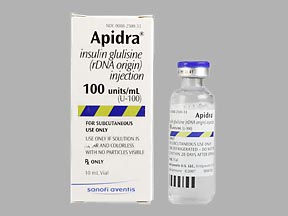
Apidra Coupons & Savings Card – Discount Prices from $69.44
My prescription
Edit
10ML of 100UNIT/ML, Apidra (1 Vial)
Select pharmacy

CVS
$104.62
COUPON PRICE
Walmart
$69.44
COUPON PRICE
Walgreens
$80.43
COUPON PRICE
Albertsons
$88.94
COUPON PRICEApidra savings card
Show this card to your pharmacist
Walmart
$69.44
BIN
ID
PCN
GRP
019876
LH09AB2E14
CHIPPO
LHX
Powered by
Related insulins prescriptions
More prescriptions for diabetes type 2
Related insulins prescriptions
More prescriptions for diabetes type 2
Price history for Apidra
1 Vial, 10ML of 100UNIT/ML
Average retail price for Apidra
Average SaveHealth price for Apidra
Our price history data is based on aggregated prescription data collected from participating pharmacies in America. Our prescription data updates daily to reflect the latest price changes. If you notice a missing data point, it means there wasn't sufficient data available to generate a monetary value for that date.
*Retail prices are based on pharmacy claims data, and may not be accurate when we don't have enough claims.
Apidra dosage forms
Dosage Quantity Price from Per unit 10ML of 100UNIT/ML 1 Vial $69.44 $69.44 10ML of 100UNIT/ML 2 Vials $157.87 $78.94 10ML of 100UNIT/ML 3 Vials $246.30 $82.10
| Dosage | Quantity | Price from | Per unit |
|---|---|---|---|
| 10ML of 100UNIT/ML | 1 Vial | $69.44 | $69.44 |
| 10ML of 100UNIT/ML | 2 Vials | $157.87 | $78.94 |
| 10ML of 100UNIT/ML | 3 Vials | $246.30 | $82.10 |
What kind of insulin is Apidra?
Apidra is a rapid-acting insulin. It is typically used to control blood sugar levels in people with diabetes, particularly around meal times.
Are Apidra and Lantus the same?
Apidra and Lantus are not the same. Apidra is a rapid-acting insulin used to control blood sugar levels during meals, while Lantus is a long-acting insulin that helps maintain stable blood sugar levels throughout the day and night. They are used in different ways as part of diabetes management.
What insulin is comparable to Apidra?
Insulins that are comparable to Apidra (insulin glulisine) include other rapid-acting insulins such as Humalog (insulin lispro) and NovoLog (insulin aspart). These insulins are used to control blood sugar levels during meals and act quickly after injection.
What is the generic insulin for Apidra?
The generic name for Apidra is insulin glulisine.
What is the therapeutic use of Apidra?
Apidra is used for the management of blood sugar levels in individuals with diabetes mellitus. It is a rapid-acting insulin that helps control blood glucose levels during meals.
